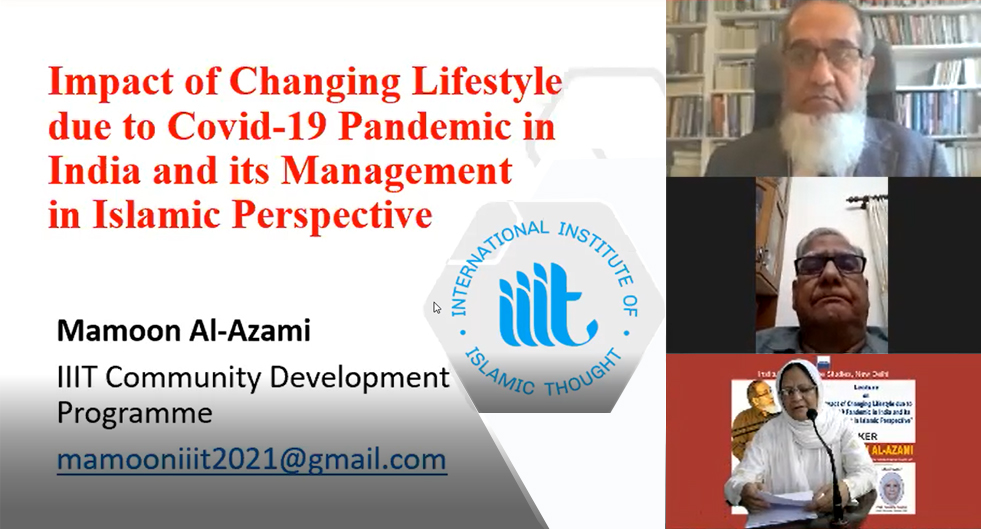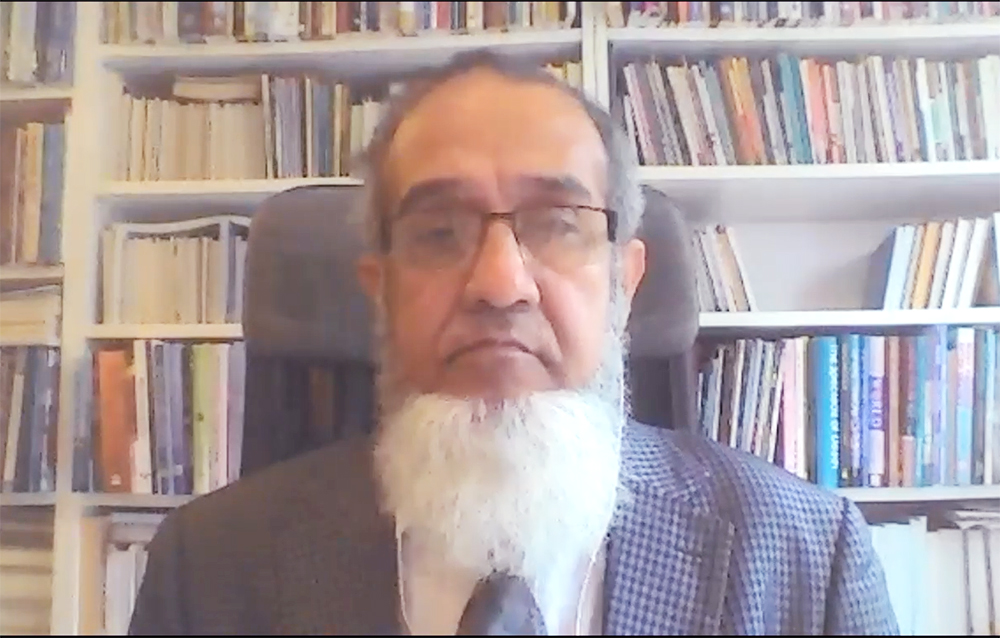IOS online Lecture on “Impact of Changing Lifestyle due to Covid-19 Pandemic in India and its Management in Islamic Perspective”

New Delhi: An online Lecture on “Impact of Changing Lifestyle due to Covid-19 Pandemic in India and its Management in Islamic Perspective” was organised by the Institute of Objective Studies on September 25, 2021.
The lecture formally commenced with the recitation of a verse from the Quran by Hafiz Athar Husain Nadwi. Prof. Haseena Hashia, Assistant Secretary General, IOS, who introduced the topic, said that this was the first lecture of a series of four lectures. Briefly tracing the history of Covid-19 pandemic, she noted that it was reported in China for the first time in December 2019 and again in March 2020, infecting about one lakh population. This was the sixth public health emergency in known history. Being the second most populated country, India suffered severely. Referring to severity of the pandemic, she said that about 50 million people working in big cities were forced to move to their home states like U.P., Bihar, West Bengal, etc. After Independence, it was the second largest migration of people from one part of the country to the other. The movement of such a large population affected education not only in urban, but also in rural areas. Covid-19 caused isolation, fear and uncertainty among people. There was mass unemployment, anxiety and depression all around. She said that similar conditions prevailed during the second wave of the pandemic, which added to the sufferings.
Delivering the lecture, head community development programme of the International Institute Islamic Thought, USA, Dr. Mamoon Al-Azmi observed that the Covid-19 brought in its wake challenges as well as the opportunities. It did have impact on human life but it was mostly negative. Driving home his point, he said that in Surah Baqarah, Allah talked about five trials and tribulations. These were similar to the examinations for going to a higher status. Tawakkul (Trust in God) was the key to understand the vagaries of nature. Covid-19 pandemic was also one such calamity that struck the people irrespective of geographical borders. He also referred to Surah Al-Fajr to buttress his point that ‘He tests man by unleashing the scourge of punishment.’ In such times, Qur’an and Hadith were there for their guidance. Surah Al-Ma’arij warned of the consequences of disobeying Allah. Covid-19 pandemic could be understood in terms of the fury that nature demonstrated in the form of epidemics. He said that Nature was sending human beings a message with the common pandemic and ongoing climate crisis.

Dr. Azmi pointed out that nature was taking revenge on human beings due to number of gross mistakes, made deliberately or otherwise. This was caused by unmindful pursuit for material gains. As far as Muslim Ummah was concerned, it should not live in fear. Instead, it should live in faith in Allah, who is the final and sole dispenser. Commenting on the general impact of Covid-19, he said that it meant an end of normal life and socio-cultural living. It also caused great risk to health, life and well-being of the people. Fear, uncertainly, instability, job loss and bankruptcy impacted the world as never before. He noted that the tourism industry alone suffered a loss of about two billion dollars globally. During this period, poverty and inequality became acute. Referring to personal impact and challenges of the pandemic, he said that people were forced to remain indoors 24/7 generating a feeling of imprisonment. Owing to the lack of physical exercises, several ailments gripped them. Similarly, work from home created unsuitable work environment. No relatives or friends visited during the pandemic, which led to the feeling of isolation. Physical and mental health risks increased due to aloofness. He held that this was a kind of imprisonment and health emergency.
Dwelling on personal impact and opportunities, Dr. Azmi said that the pandemic offered an opportunity to be close to the family, rather than a chance to be closer. Flexibility of work time was another advantage of work and rest. It also saved the community from travel fatigue and financial cost of travelling. This was an opportune time for self-development. Explaining the family impact and challenges, he said that families were not used to being together 24/7 for a long time. Children suffered loss of education due to closure of schools and missed friends. Parents were overwhelmed with restless children not knowing how to keep them busy. Couples got into fighting with domestic violence cases on the rise globally usually for 24 hours. Millions of jobs were lost, which led many to poverty. With regard to the impact and opportunities to families, he said that living 24/7 with spouse and children offered them a chance to bond and catch up with their lives. Parents could teach children their values and culture. This was an extra-ordinary opportunity to unite the family. They could share joy and sorrow of Covid-19 together, he noted.
Dr. Azmi remarked that the Covid-19 pandemic threw social challenges as people felt disconnected in the absence of visiting family and friends. Besides, social and emotional isolation among people impacted their lives. If the social impact of the pandemic created a host of problems before the people, it also offered several opportunities. These included distances and separation that created sweeter relationship. He said that social isolation gave space for evaluating relationships. Relationships that were strained could be recovered with the passage of time. Social conflicts were easily avoided under the threat of Covid. Referring to economic challenges, he said that the quarterly loss of the GDP in June 2020 stood at 24.4 percent while the quarterly growth in September that year contracted by 74 percent. There was drastic cut in export-import causing business losses. According an estimate, the lockdown cost a huge loss of 4.64 billion dollars for a day. Similarly, the informal sector, which employed 70 per cent poor, registered a huge loss of jobs. Remittances sent by Indians abroad suffered a loss of 83 billion dollars. Commenting on the opportunities resulting from the economic impact, he said that reduced economic recoveries made restructuring much easier. As the economy recovered, new jobs were generated. Oil prices dramatically fell, saving US dollars as import costs. RBI and the government were offering stimulus packages for growth. Another boon in disguise was reduction in cars and flights that reduced the impact of pollution, he noted.
Speaking briefly on international impact of Covid and the challenges lying ahead, Dr. Azmi observed that export of goods and services suffered 32 percent loss while foreign exchange earnings fell by 76.3 percent (National Council of Applied Economic Research). During the first quarter of 2021, 14.5 million jobs were lost in the tourism industry. International impact also yielded opportunities that included better infrastructure and logistics. This also led to the simplification of various laws, including labour laws. A single window clearance could enable to develop a robust manufacturing ecosystem to help attract foreign capital, latest technology, and to create jobs and boost exports. Explaining the Islamic perspective on managing the impact, he said that only the learned knew the secret of the universe. Quoting Quran and Hadith, he said that only those who were patient would receive their rewards, unabridged, without limit. Ease and difficulty were rotating. He observed that when Allah desired good for someone, He tried them with hardships. All the prophets went through trials. Adam was tried through the Satan in Jannah. Noah was tried by the rejection of his people and his disbelieving son and wife. Abraham, Ayub, Daud, Musa, etc., also faced such trials, he noted.
Dr. Azmi presented a plan of action to face the challenges caused by the pandemic. He advised against giving up hope on the Most Merciful, Allah. Trial must be used to build resilience knowing that it would pass. He asked for making pragmatic planning to face challenges. Alliances must be sought and secured to support the plan. He advised to rely on Allah’s help while implementing the plan. While examining the opportunities, confidence, competence, and courage should be strengthened to overcome difficulties. He also focused on the five. The ‘D’ formula to face challenges. Nature had taken revenge on humanity. There were public service, commercial service, community service and personal service. When the problem came, it should be examined first. Quoting Mother Teressa, he said that one could not solve the problem alone, when a problem came, it gave the opportunity for the family to remain together. Husband should be the leader and the wife should work as the deputy leader, and both of them should support each other emotionally. One should not forget that God is merciful and also revengeful. One needed to be a helpful human being. He observed that problems created opportunities too. He concluded by expressing his opinion that, for him, Covid was man-made because it was being developed in a laboratory. He also said that social harmony and economic growth should remain in focus.
Presiding over the function, the Secretary General, IOS, Prof. Z.M. Khan, held that money was also a factor in lockdown times as those who possessed it, properly planned it. Referring to knowledge, he said that it could not be bifurcated as knowledge was after all knowledge. Islam asked the man to learn for living in his time.
Family as an institution was very important in Islam and one had the time to live in family. Many differences were sorted out when one lived in family. Covid period provided an opportunity for reading because a lot of time was available. He urged Dr. Azmi to be more involved in the activities of the Institute. He said that the IOS concentrated on research in conceptual field as well. A translation bureau was in place to get IIIT books translated and published into different Indian languages. He looked forward to the future cooperation and coordination with him.
The lecture ended with a vote of thanks proposed by Prof. Haseena Hashia.
Go Back